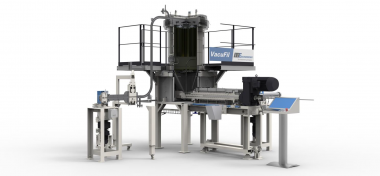Schweizer Textilhersteller Schoeller Textil AG mit neuem Branding
- Leitgedanke „Textile Intelligence“ und Nachhaltigkeit im Fokus
Das seit 150 Jahren agierende Traditionsunternehmen Schoeller Textil AG machte es sich stets zur Aufgabe, textile Innovationen im Einklang mit der Natur zu entwickeln. Jetzt vollzieht das Unternehmen ein umfängliches Rebranding. Das Ergebnis verkörpert den neu definierten Leitgedanken „Textile Intelligence“ – die Entwicklung und erfolgreiche Umsetzung innovativer Textilien und intelligenter Textiltechnologien.
“Das Ziel des Rebrandings ist es, die traditionellen Markenwerte in einer völlig neuen Markenpräsenz zu kommunizieren. So entstand ein geschärftes Markenprofil, eine klare Markenstrategie und -tonalität sowie ein cleanes, modernes Corporate Design. Wir werden unserem Nachhaltigkeitsanspruch durch den Ausbau digitaler Touchpoints, deren crossmedialen Nutzung und einer verstärkten Onlinepräsenz gezielt nachkommen. Simplifiziert, geradlinig, nachhaltig – ganz im Sinne unserer größten Inspirationsquelle: der Natur,“ Antonio Gatti Balsarri, Chief Commercial Officer, über den digitalen Fokus der neuen Marke
Transparenz und Nachhaltigkeit - damit die zentralen Anforderungen von Kunden gegenüber Brands - stellen die Kernaspekte des Rebrandings dar. Im Logo-Design wurde eine starke Reduzierung der Logo-Elemente durch die Eliminierung der Signatur-Farbe Rot und dem schwarzen Hintergrund vorgenommen. Das modernisierte Schoeller Logo lässt sich nun gepaart mit dem neuen Markenclaim „Textile Intelligence“ durch die gewonnene Transparenz deutlich ressourcenschonender produzieren.
Schoeller ist bluesign system partner der ersten Stunde und nutzt das Higg Fem Modul zur Einschätzung der nachhaltigen Performance. Höchste Qualitäts- und Nachhaltigkeitsstandards in der Produktion bedeuten neben umweltschonenden Herstellungsprozessen und sorgfältiger Materialauswahl, insbesondere faire Arbeitsbedingungen zu gewährleisten. Schoeller folgt einem Code of Conduct, um transparente Produktionsketten, den Schutz der Umwelt und faire Arbeitsbedingungen zu garantieren.
„Zero Textile Waste“ wird zu einer gezielten Markenstrategie. Die Produktion von Textilien und Textiltechnologien wird kontinuierlich zur Schonung von Ressourcen optimiert – dennoch sind die Verarbeitungsprozesse oft aufwendig und komplex. Hier bietet Schoeller neue Lösungsansätze zum Thema Zero Waste.
So wurde der Sustainability Webshop „Schoeller re-Fabric“ bereits erfolgreich veröffentlicht. Textile Restbestände aus der Produktion werden hierüber an Designer und kleinere Produktionen verkauft, wodurch die gesamte Nutzung der Produktionsmenge erhöht und Textilverschwendung vermieden wird.
Schoeller Textil AG









